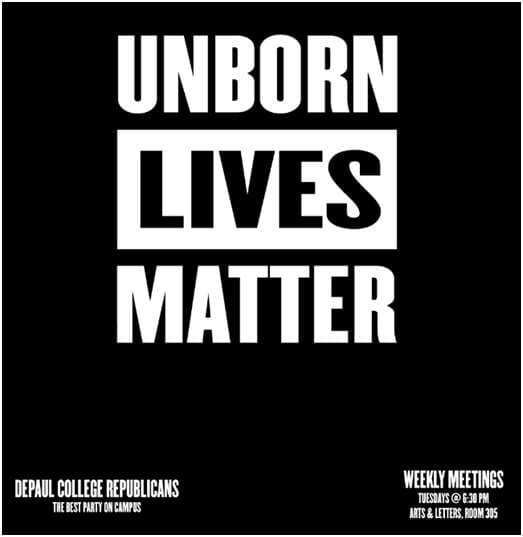The Volokh Conspiracy
Mostly law professors | Sometimes contrarian | Often libertarian | Always independent
DePaul University forbids College Republicans' posting of 'Unborn Lives Matter' poster

Last week, Scott Jaschik (Inside Higher Ed) reported:
DePaul University has ordered the campus Republican group to redesign posters that read "Unborn Lives Matter" if the organization wants permission to post them on campus. …
The Reverend Dennis H. Holtschneider, president at DePaul, released a statement in which he said that the Republicans banner "provokes the Black Lives Matter movement." He elaborated: "Some people will say that DePaul's stance unfairly silences speech to appease a crowd. Nothing can be further from the truth. As we experienced last spring, it's not difficult to agree that there is a difference between a thoughtful discussion about immigration and a profane remark about Mexicans scrawled in the quad, or between a panel on racial climate and a noose - a powerful symbol of violence and hatred - outside a residence hall. In both recent cases, the first, we encourage; the second, we abhor."
DePaul is a private university, so the First Amendment doesn't restrict its ability to block such speech. But we have a First Amendment right to criticize DePaul (especially when it claims to be "committed to fostering a community that welcomes open discourse"), and I think we should.
There is no sound analogy between the poster here and "profan[ity]" or "symbol[s] of violence and hatred." The message of the poster, I take it, is that abortion is killing vastly more blacks than police officers are and that we should focus at least as much on that death toll as on the death toll on which the Black Lives Matter movement is focusing. (I may be mistaken, and the message may simply be that abortion is bad, but I suspect the message is the more complex one I just mentioned.)
One can, of course, disagree, either because one doesn't think that abortion is tantamount to (or even close to) killing of born humans, or because one thinks that the discussion about abortion shouldn't be used to diminish the significance of the Black Lives Matter movement. But whatever one may say about the merits of the "Unborn Lives Matter" argument, and its perceived criticism of the Black Lives Matter movement, that criticism is well within the bounds of civil discourse. (It may not be terribly deep scholarly argument, being just a slogan, but "Black Lives Matter" is likewise just a slogan, too.)
Indeed, if one wants to see an illustration of the slippery slope from what are always billed as narrow, modest restrictions on just the worst sorts of speech to much broader restrictions aimed at suppressing certain viewpoints - or protecting viewpoints from criticism - this is a perfect example.
Indeed, if Rush Limbaugh had offered this as a hypothetical example 10 years ago, in order to criticize campus speech codes - "They say they're just trying to suppress 'hate speech,' but soon they'll be banning anything that criticizes any perceived 'civil rights' position" - I suspect people would have accused him of creating a straw man. "What a ridiculous argument!" they would have said; "we can trust universities to tell the difference between hate speech and simple disagreement with civil rights orthodoxy." (I've certainly heard lots of such responses myself over the years.) And yet here we are.


Show Comments (0)